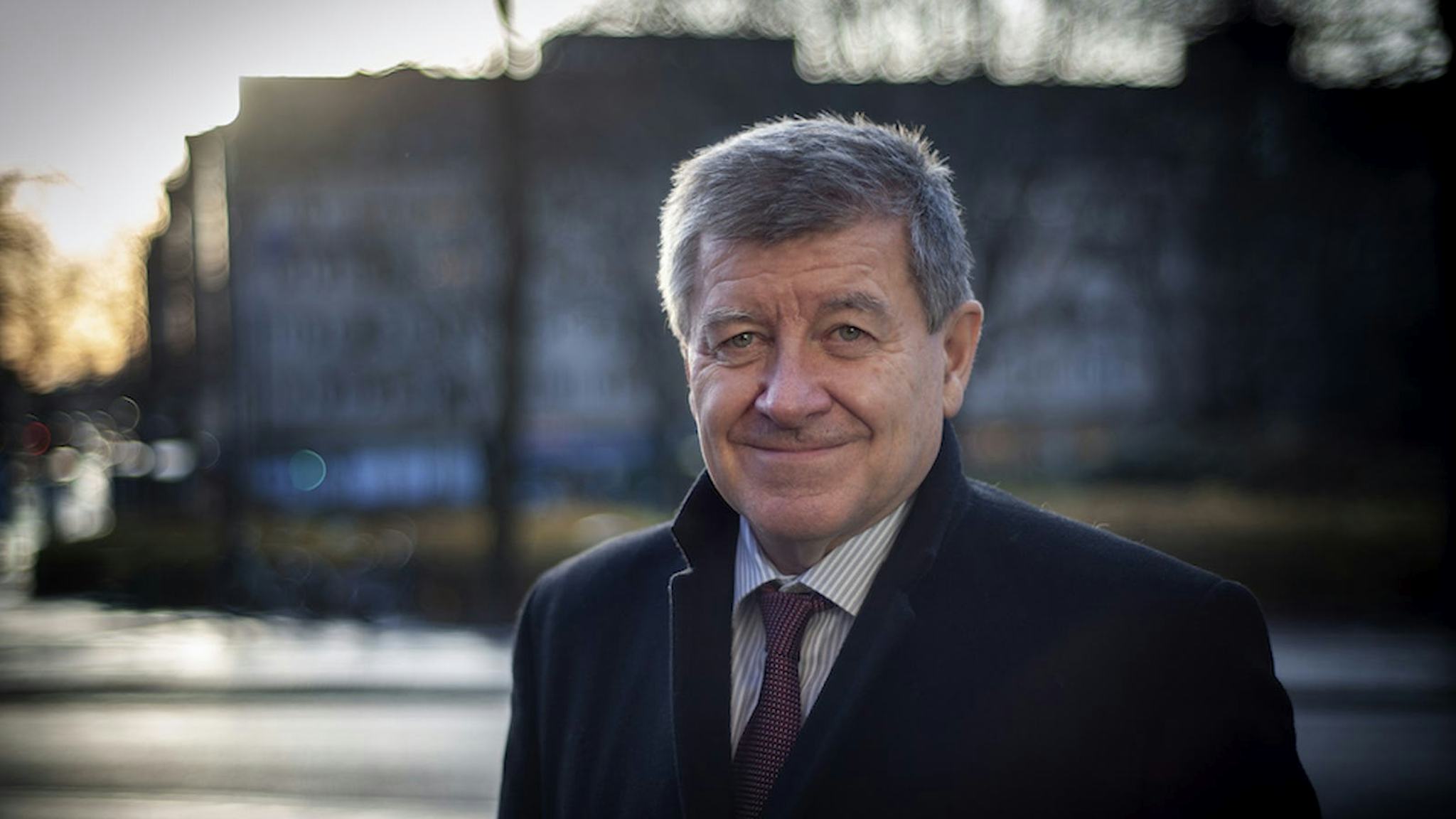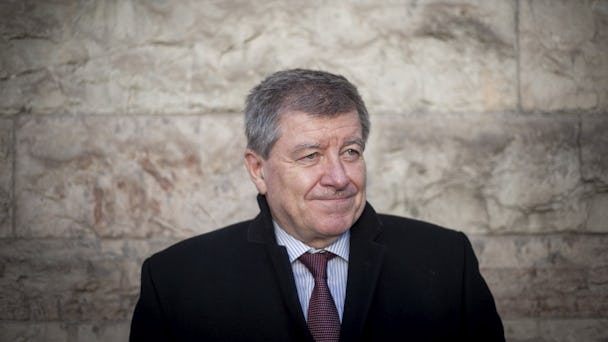“I never looked for this job and I don’t think I am going to miss it”
After ten years in office, Guy Ryder is stepping down as Director-General of the ILO. In an interview with Arbetet Global, he talks about accomplishments, regrets and why he feels like an imposter when he goes to bed at night.

“I sort of feel like I’m coming to the end of a hard days work done quite well,” says the ILO’s departing Director-General Guy Ryder.
You were appointed Director-General in 2012. Looking back, are you satisfied with what you and the ILO have achieved?
“That’s a much more complicated question to answer than it sounds. If you look at the state of the world of work, if you look at the problems and challenges that people face, it would be totally wrong to say that one can feel satisfied. So no, I don’t leave with any feeling that we have gone far enough.”
“On the other hand, I do think that we at the ILO have tackled important questions, made good progress. I sort of feel like I’m coming to the end of a hard days work done quite well.”
Anything you look back at with pride?
“In 2019 we celebrated the centenary of the ILO, the oldest organisation of all in the UN system, and we did a really successful operation looking at the future of work, the biggest possible subject. That process went on for a couple of years, and included a global commission which Prime Minister Löfven co-chaired with the President of South Africa. We adopted a declaration on the future of work, which I think is a really impressive document.”
“Governments, workers and employers from 187 countries agreed on what is effectively a blueprint for the challenges of the future. And what it does is summarize, in an operational way, the challenges we have to take onboard, for the future of work to be what we want it to be. This was important to me.”
This is a frozen conflict at the heart of the ILO. And like all frozen conflicts it can flare up again.
Any regrets?
“Yes. We had a big controversy in the ILO for the last decade, so all of my time at the ILO, around the international labour standards system that the ILO negotiates and supervises. Without going to deeply into the technical details, we had a big fight, literally when I arrived, one month after taking office, about whether there is a right to strike in international labour law. That led to all sorts of other controversies about our supervisory system, which basically challenges the foundation of the ILO’s standards system. That conflict has not been resolved.”
“We’ve learnt to live with the problem, we’ve found ways to agree to disagree, but we haven’t solved the problem. This is a frozen conflict at the heart of the ILO. And like all frozen conflicts it can flare up again. It needs to be solved. And I will leave the ILO without having been able to do that.”
Will it take a Director-General who doesn’t have a trade union background to solve this conflict?
“I don’t want to comment on any of the candidates in the upcoming election. I came pretty directly from the trade unions. At the time some people felt that it meant you would have a Director-General that would tip the boat in one direction. I had to convince people that I was capable of bringing a balanced leadership, a fair leadership. And I honestly think that if you speak to governments, this is what they say to me anyway, they will say that I have understood my responsibility to be a Director-General for everybody. Honestly, whilst one has to be careful, I’ve never found myself in a situation of conflict, in my own mind, with my own principles.”
“But once you have been arguing with the same people for too long, sometimes it takes somebody new to break the deadlock. I think that a new face at the table enables everybody to take a deep breath. I hope and believe that the next Director-General will be able to break this impasse.”
What advise would you give your successor?
“I’m very reluctant to give advice. Advice is sometimes unhelpful and quite frequently unwelcome. I suspect any of the people running for the job have a pretty good idea about what the challenges are and how they intend to address them. It’s not out of any bad will. If anybody want to call me and ask for my opinion I would be happy to give it, even though I’m not sure it is such a good idea.”
“The only thing I would say is: Just value the organisation. I’ve never stopped thinking that it is an extraordinary and marvelous asset.”
In 2016, you described Donald Trump’s victory in the US presidential election and the UK’s vote for Brexit as “the revolt of the dispossessed”. A couple of years on, is this still the big risk the world is facing?
“Well, we’ve seen the change of the pendulum, haven’t we, in the United States? I do think that the election of Donald Trump and Brexit had to do with people feeling left out, left behind, and wanting a radical change. I think it is also fueled by other things, like social media and fake news, but as long as we don’t manage to make our labour markets more fair and inclusive, then this type of phenomenon will be with us.”
“I don’t think that the populist wave is gone, it is still with us and Sweden has its own situation to deal with. It coincides with a rise of authoritarian attitudes, including in formal democracies. That’s quite a dangerous cocktail.”
“Whether we like it or not, international cooperation and multilateralism is one of the best antidotes we have. And I worry that at a time when we have never needed international cooperation more, the political appetite for it seems to be at quite low levels.“
ILO’s Director-General
Englishman Guy Ryder took over as ILO Director-General in 2012. He has a labour union background and began his career at the British trade union federation TUC’s international department in 1981. From 2002 to 2010, he led the international trade union ITUC and its predecessor ICFTU.
The new Director-General will be appointed by the Governing Body of the ILO on the 25th of March 2022 and will take office on the 1st of October.
The Governing Body consists of representatives of governments, employers’ organizations and labour unions. The posts in the Council rotate between ILO members.
If democracy declines in states that are members of the ILO, is there a risk that those states infect the organisation with authoritarianism?
“I think there is closing democratic space in many countries and that places ILO’s non governmental constituents under pressure. One of two things can happen: Either those constituents lose their independence, or they keep that independence but change their discourse. But my experience has always been that, particularly, trade unions have been bulwarks against encroaching authoritarianism. And I actually think that the tripartite structure of the ILO makes it a point of resistance.“
“I don’t want to mention specific countries, but you will find in the ILO that complaints are made against certain countries, because the workers dare to do it. They criticize countries which in other parts of the UN are not often subjected to criticism, because governments for diplomatic, or other reasons, feel that they cannot make an enemy of that country. Tripartism and social dialogue can be slow, it can be complicated, it can be frustrating. But it is fundamentally important, and along with the presence of non governmental actors, it is one of the extras that the ILO brings to the UN.“

I sort of go to bed at night thinking ‘I’m the real imposter, I’m not the syndrome’.
Ahead of interviews like this, I always try to prepare at least one really though question, but this time I drew a blank. Everyone likes you, even the employers. You keep your personal life personal. There is no controversy surrounding you. What are you hiding?
“The one thing I can say is that I’m probably as surprised as anybody to find myself in this job. They often say that people in leadership positions suffer from the imposter syndrome, does that mean something to you? Well, I sort of go to bed at night thinking ‘I’m the real imposter, I’m not the syndrome’.“
“I never expected to be in the job, never consciously looked for it and I don’t think I am going to miss it. That’s probably a contradiction, because I will always take an interest in the future of the ILO. I just think that I have been extraordinarily lucky and hope that it didn’t change me too much. But it is time for me to go home and do something else.“
So what will you do now?
“No plans, certainly no ambitions for anything. I’m going to settle in Belgium with my wife so I’ve got to learn some Dutch. Having spent so long in international work, I’d be anxious to get down to something which is a bit closer to the ground. I miss that sort of reality check. Being in workplaces, talking with grass root trade unionists. And if I can be helpful in any way, I’ll always be around.“
The International Labour Organization
The ILO was founded in 1919, by industrialised nations reeling from World War I. Social justice was believed to be a condition to building universal and lasting peace.
The ILO is both the oldest and the smallest U.N. agency.
It’s also the only tripartite agency of the U.N., where governments, trade unions, and employers are the three parts of the decision making process.








